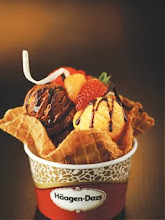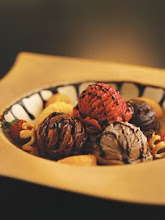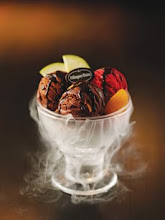Chocolate makers show off Syria's sweeter side
Share
Ahmad Khatib
Wednesday, 14 April 2010 11:25
DAMASCUS – Belgium and Switzerland may be the current kings of chocolate, but Syrian confectioners believe another country deserves to be up there too, and already they are feeding an international sweet tooth.
Syria's traditional Arabic sweets are loved across the Middle East, and its people are famed for their culinary skills, with a rich cuisine built on the abundant produce of Damascus' fertile green belt, the Ghouta.
A shop assistant is seen displaying chocolate at the famous Ghraoui confectionery in Damascus.
But few realise it also makes first-class chocolate, with an export industry that is booming as the Syrian economy opens up to the world.
Despite long having had a reputation as the bad boy of Middle East politics, Syria is slowly emerging from international isolation. And among those taking the lead are Syrian confectioners.
"Why Syrian chocolate? Why not? What do countries like Switzerland and Belgium have that we in Syria don't have to make chocolate?" Bassam Ghraoui, who heads Syria?s most famous chocolate maker, told AFP.
"It's a big challenge, but the fact that we produce luxury chocolate which is double the price of Belgian chocolate, for example, is a sweet surprise for many people" because the high price reflects its high quality, he said.
"Best foreign chocolate"
The civil engineer turned entrepreneur said his father Sadek was the first to manufacture chocolate in the Middle East in the early 1930s.
Ghraoui, which also has shops in Arab countries, also sells dried fruits in Europe, including in outlets such as Harrods department store in London, and in Russia.
But now the family firm is facing competition from others such as Zenbarakji and Art Chocolate, which have also made forays into the global market.
"The Syrians have a rich heritage. We import cocoa from Africa, hazelnuts from Turkey and the rest is all Syrian," Ghraoui said of other local ingredients such as fruit and more nuts.
In 2005, his firm won the prestigious Prix d'Honneur for "best foreign chocolate" at the Salon du Chocolat in Paris, the world's largest annual chocolate show.
"At one Paris show, we ran out of chocolate samples because people loved our products," Ghraoui said, adding that 60 percent of the firm's production is exported -- and that figure could hit 80 percent in the future.
Ghraoui says it sells more than 30,000 kilograms (around 66,000 pounds) of chocolate a year to online customers in France alone through the websites of European partners.
Syria's chocolate industry
No government figures are available about the size of Syria's chocolate industry.
Other Syrian chocolatiers and confectioners are also making their mark.
"My father started to produce chocolate and other sweets in 1936, and our business has developed to this day," said Said Zenbarakji, owner of the Damascus-based Zenbarakji Company for Processing and Developing Chocolate and Sweets.
"The real competition started in 1990, when the company began to export chocolate to Arab countries likeLebanon, Egypt, Saudi Arabia and Qatar," he said of the family firm's decision to take on other local firms.
Around 10 years ago, Zenbarakji also began sending its wares abroad to Europe, Canada, Brazil and Hong Kong.
"Our products are entirely made in Syria, and there is no doubt that Syrian chocolate can compete and is in demand abroad," he said.
According to Khalid Sammani, owner of the Aleppo-based Art Chocolate company, another family business that was launched in 1923, "we face strong competition locally and internationally."
"We sell our chocolate in Arab countries, America and Canada, and it's not an easy thing to do but Syrian chocolate is still in demand and we are making progress."
At home, the customer base remains strong.
"It's so good, and I am almost addicted to it," said one cheerful woman at a Ghraoui shop in Damascus as she enjoyed a piece of palmyra – dates filled with almond and coated with dark chocolate.
"It doesn't help me diet as you can see, but I can't help it," she said of the luscious speciality, named after Syria's ruined and famed desert city on the ancient Silk Road from China to the Mediterranean. — AFP
Subscribe to:
Post Comments (Atom)































No comments:
Post a Comment